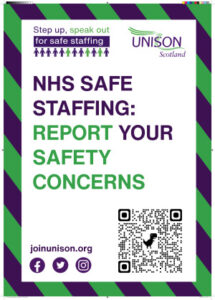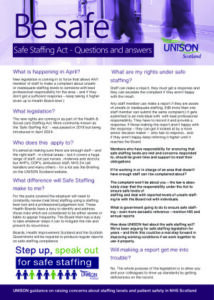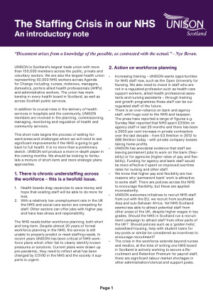 The Health and Care Staffing (Scotland) Act – often called the ‘Safe Staffing Act’ – was passed by the Scottish Parliament in 2019 and will come into force in 2024.
The Health and Care Staffing (Scotland) Act – often called the ‘Safe Staffing Act’ – was passed by the Scottish Parliament in 2019 and will come into force in 2024.
The Act places a duty on Health Boards to ensure that: “at all times suitably qualified and competent individuals…are working in such numbers as are appropriate” – both to provide healthcare and (secondary to that) “the wellbeing of staff”.
The act also gives all NHS staff the right to raise concerns about short or inadequate staffing, and have those concerns investigated. The new measures may not have the teeth that we would like – but give staff an important platform to make short staffing an issue that employers can’t ignore.
FAQs and briefings: who is covered and their rights
Survey shows failure of the Scottish government to prepare for the Act
UNISON’s survey lays bare the reality of working in Scotland’s NHS and reveals:
- Eight in ten staff no longer have confidence in existing procedures for dealing with inadequate staffing
- Almost two thirds (65%) of staff were unaware of the NHS Safe Staffing legislation
- An overwhelming majority (89%) of staff had received no training on the new regulations
Matt McLaughlin, UNISON Scotland’s head of health, said: “The government has had over four years to prepare for this new law, yet guidance was only made available four days before it became law.
“There’s a direct link between staffing levels and high quality outcomes for patients. Our members repeatedly tell us they do not have enough staff or enough time to give patients the care they need and deserve.
“In wards where they do meet staffing requirements, there is often not the correct skill mix to meet patients’ needs. This puts patients’ safety at risk and puts staff in unacceptably stressful situations.
“The reality is that staff don’t believe things are safe and NHS staff are left picking up the slack while no one holds their hospitals accountable.”
Campaign to report incidences of short staffing
 UNISON has produced NHS staff with the facility to report safe staffing concerns directly to your local health board’s chief executive or nursing director – using local unison branch reporting forms.
UNISON has produced NHS staff with the facility to report safe staffing concerns directly to your local health board’s chief executive or nursing director – using local unison branch reporting forms.
If you complete and submit a form it will be sent directly to the chief executive or nursing director and your local UNISON branch will also be copied in.
Your form will NOT be anonymous. And is not a substitute for Datix reporting. NHS Health Boards are required to have a board wide mechanism for reporting concerns – in most Boards this will be the Datix system. You should always raise concerns using the NHS board’s system. But if you also report to your union we can follow build up a picture of short staffing problems and follow up your concerns
Matt McLaughlin continued: “The Scottish government does not have a true picture of the scale of the short-staffing situation in the NHS as incidents of short-staffing are chronically under-reported – staff simply do not have the time. And an obvious weakness is that key support staff are not included.
“The Act is potentially a powerful tool for driving up standards – but it can only make a difference if people know how to use it. And when incidents are reported, there is help from health boards to fix the situation.




